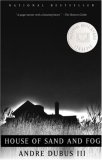Summary | Excerpt | Reading Guide | Reviews | Readalikes | Genres & Themes | Author Bio

"What do you think you are looking at, Behrani?" she says in our mother language as she reaches for another sugar cube. She does not take her eyes from me. Her hair is tousled in the rear. I think of our children, and I smile at her and the cassette tape ends and the machine clicks off at once.
"Nadi-joon, today there may be a big opportunity for us." I of course say this in English, but it is never any use for if she answers at all it is only in Farsi.
She says nothing. She turns over the Daryoosh cassette and she does not wait for me to proceed about this opportunity. She reaches to turn up the volume, and I rise and leave the room and dress into a summer's weight gray suit.
It is not one of my finer sets of clothes, for I do not wish to appear pooldar, nor however do I wish to seem like a beggar in the marketplace. Before leaving, I kiss my son on the top of his head as he eats his cold cereal at the small breakfast table in the kitchen. His hair smells of sleep and needs washing. He is dressed in a loose T-shirt and shorts, and beside him on the floor is his skateboard and bag of newspapers. He has only fourteen years, but he is already my height--175 centimeters--and he has his mother's face. Both my children have Nadi's small, beautiful face.
The house is one-story but in a good state of repair. It is painted white and appears quite bright in this early sun that is already hot on my head that still carries no hat. There are hedge bushes beneath the windows and a small lawn of grasses in front that is in need of trimming. The street is called Bisgrove, and it is on a hill with houses built closely together on one side, a woodland on the other. But the county tax gentleman was correct; the street is not so steep one can see the water, only the pale morning sky so high and wide over the rooftops. Opposite the road are evergreen woods and brush and farther up are even more homes, all small, many with bushes and fences separating the lawns. I look once more at the woodland, at the fashion in which the sunlight drops through the branches, and I am thinking of our summer home in the mountains near the Caspian Sea, of how the light was the same in those trees along the winding earth road to our bungalow, and for a moment, I feel a sense of sarnehvesht, of destiny, and as soon as I do, I stand erect and look back at the property with as cool an eye as I am able, for I do not wish my judgment to be weakened at the point of sale.
Within thirty minutes we are all assembled, the county tax gentleman, the auctioneer, and only two prospective buyers: a young couple, a boy and his wife, who has not as many years as my daughter Soraya and is dressed in blue jean pants and white basketball shoes; and a gentleman close to my years, though very fat, as large as Torez, and he is dressed in a fine pair of suit pants but no jacket, simply a loose tie and white dress shirt that is stretched over his belly, and he is sweating on the forehead and above the lip. It is him I view as my main opponent, and all of his sweating makes me straighten my shoulders and I feel quite calm.
First, the county tax gentleman takes us for a walking tour through the bungalow. There is no air-conditioning, but the rooms are cool and I note every floor except for kitchen and bathroom is carpeted. The living room is large enough, and the dining area is a counter with stools where the kitchen begins. In the rear are three rooms, and as we step out in the backyard, I pat my breast pocket and touch the certified check from the Bank of America.
The young wife is very fond of the rear lawn, which is small and surrounded by evergreen hedges taller than a man. They shade us from the morning sun, and she begins to tell to her husband of the privacy they might have here, but it is the sweating gentleman, the radish, I am regarding. He stays close to the county tax officer and the auctioneer, who has as many years as me, carries a notepad and pen, and wears a department-store necktie and shirt. He has upon his face a confused expression, and he pulls the county tax gentleman aside for a quiet word.
Excerpted from House of Sand and Fog by Andre Dubus III Copyright© 1999 by Andre Dubus III. Excerpted by permission of Vintage, a division of Random House, Inc. All rights reserved. No part of this excerpt may be reproduced or reprinted without permission in writing from the publisher.




A truly good book teaches me better than to read it...
Click Here to find out who said this, as well as discovering other famous literary quotes!
Your guide toexceptional books
BookBrowse seeks out and recommends the best in contemporary fiction and nonfiction—books that not only engage and entertain but also deepen our understanding of ourselves and the world around us.